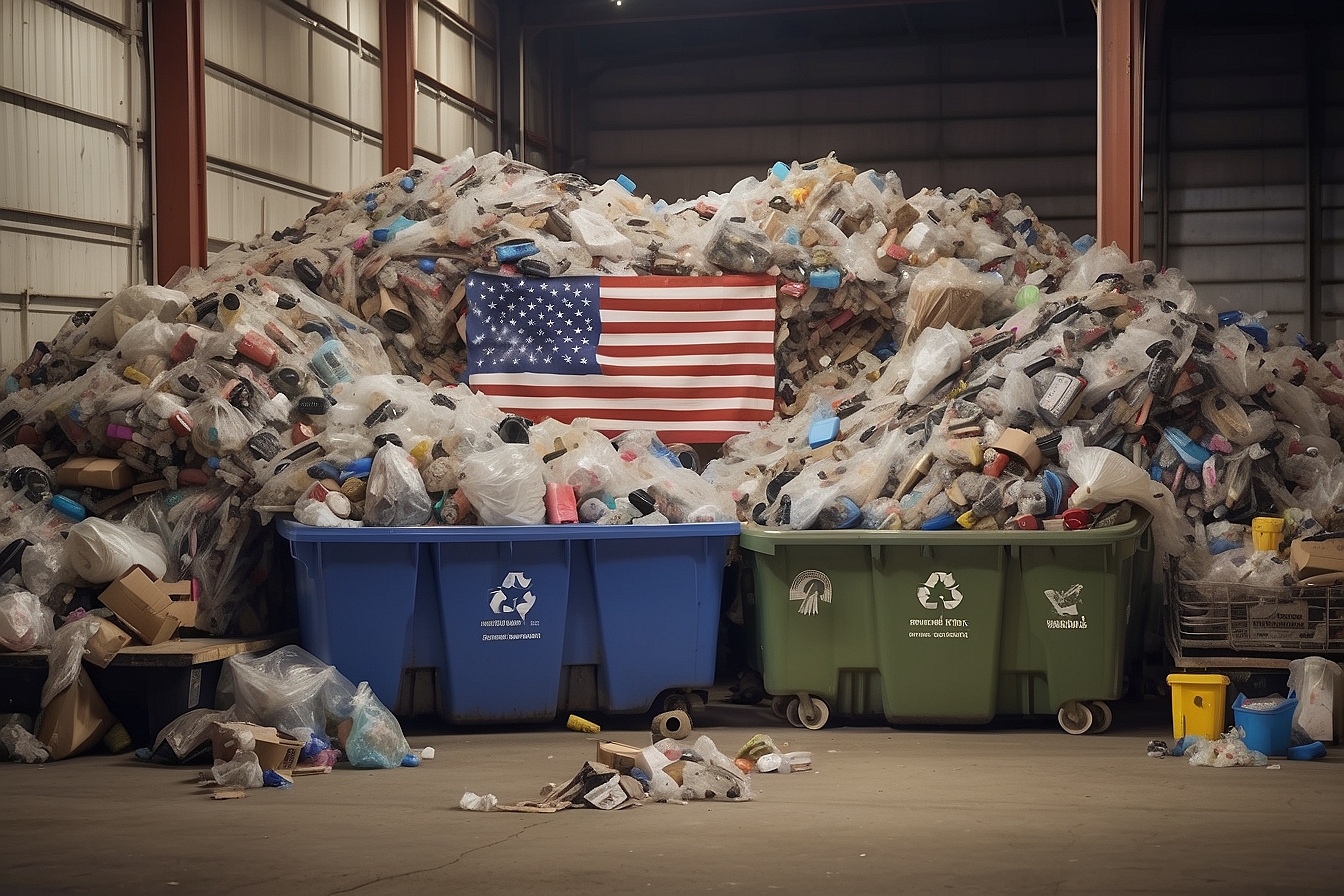We’re all too familiar with the burgeoning piles of rubbish that seem to be ever-increasing – it’s a pressing issue that can’t possibly be ignored. Like many others, we’ve witnessed its impact firsthand, and it’s startling to think that nearly 90% of this waste has the potential to be recycled or composted.
In this feature, we’ll delve into the transformative steps we can take towards our throwaway habits which not only promise to safeguard our green spaces but also have the power to stimulate economic growth.
Join us as we explore how to turn what was once waste into a golden opportunity!
Key Takeaways
- Recycling reduces costs for businesses and governments by lowering the amount spent on raw materials and waste disposal.
- Effective waste management practices, such as recycling, create jobs, stimulate economic growth, and attract investment in sustainable industries.
- By participating in recycling programs, individuals can make a significant environmental impact, conserving natural resources and reducing pollution.
- Businesses that implement strong waste reduction strategies can save money through lower operational expenses and avoid potential regulatory fines.
- The production of new materials from recycled items consumes less energy than producing them from virgin resources, promoting energy conservation.
The Economics of Recycling
The economics of recycling involves understanding the impact of waste management on productivity, government spending, and the environment. Businesses also play a crucial role in waste management practices.
Understanding the economic implications of waste management
We often overlook the hidden costs that come with inefficient waste management. Every time we toss something away, local authorities must spend public funds to collect and dispose of it.
These expenses add up across our communities and impact everyone’s wallet. By investing in effective recycling programs, we can reduce these financial burdens.
Improper rubbish disposal also leads to environmental damage, which comes with its own set of economic consequences. Cleaning up pollution and restoring habitats can be incredibly expensive, not to mention the loss of natural resources that could have been recycled or reused.
We see this as a call to action—promoting resource conservation is crucial for both ecological balance and sustainable development of our economy.
How waste management affects productivity and government spending
Improper waste management hampers productivity, affecting both public and private sectors. Inadequate waste disposal leads to environmental pollution, resulting in health issues for the workforce and an increase in sick leave.
This ultimately impacts productivity as employees may become less efficient due to illness or reduced morale. Additionally, government spending rises due to the need for healthcare services and environmental remediation efforts.
Furthermore, when waste is not managed effectively, it can lead to increased operational costs for businesses and governments alike. The expenses associated with waste cleanup and containment divert funds from other essential projects that could benefit society at large.
The environmental impact of waste management
The environmental impact of waste management is significant. Proper waste disposal and recycling contribute to pollution reduction, natural resource preservation, and energy consumption.
It also supports a circular economy and resource efficiency. Businesses play a vital role in waste management by implementing green technology and promoting sustainability. As environmentally conscious individuals, the choices we make regarding waste management have a direct impact on the environment’s health and well-being.
Supporting conservation and environmental sustainability through effective waste management practices benefits us all in the long run.
The role of businesses in waste management
Transitioning from the environmental impact of waste management, we acknowledge the substantial role that businesses play in waste management. Companies hold a significant responsibility to manage their waste effectively and minimise their environmental footprint.
Businesses engage in responsible waste management practices by implementing recycling programmes, reducing single-use materials, and investing in sustainable packaging solutions.
Businesses can also partner with waste management companies to ensure efficient collection and disposal methods for their generated waste. By embracing eco-friendly initiatives, companies can contribute to resource recovery and incorporate renewable resources into their production processes, ultimately fostering a green economy.
Moreover, through cost-benefit analysis, businesses can identify opportunities for waste reduction that not only positively impact the environment but also lead to financial savings.
Economic Benefits of Recycling and Waste Reduction
Recycling and waste reduction create jobs, save money for waste generators, and have a positive impact on the environment and sustainability. Read more about the economic benefits of recycling in our blog!
Creating jobs and stimulating the economy
Recycling and waste reduction initiatives lead to the creation of new jobs in the recycling industry, which contributes to economic growth.
- Recycling plants require workers for sorting, processing, and managing materials, offering employment opportunities.
- The demand for recycled products fuels the manufacturing sector, creating additional job openings.
- As the economy benefits from increased recycling activities, more businesses invest in sustainable practices, further boosting employment opportunities.
- By supporting recycling efforts, individuals contribute towards a more sustainable economy whilst creating employment for others.
Saving money for waste generators
We’ve discussed the positive economic impact of recycling, such as creating jobs and stimulating the economy. Now, let’s explore how waste generators can save money through effective waste management:
- Reduced purchasing and disposal costs: By recycling and reducing waste, businesses can decrease their need to purchase new raw materials and pay for waste disposal, leading to significant cost savings.
- Lower operational expenses: Efficient waste management practices can streamline operations and reduce energy consumption, resulting in lower utility bills and operational costs for waste generators.
- Regulatory compliance savings: Implementing waste reduction measures can help businesses comply with environmental regulations, avoiding potential fines and penalties that could impact their bottom line.
- Enhanced brand reputation: Embracing sustainable waste management practices can improve a company’s image, attracting environmentally conscious consumers and potentially increasing sales.
- Long-term financial benefits: Investing in recycling initiatives may require an initial cost outlay, but over time, the long-term financial benefits can outweigh the initial investment through reduced expenses and increased efficiency.
- Opportunities for revenue generation: Waste generators can explore opportunities to generate additional revenue from recycled materials or byproducts, contributing to their overall financial sustainability.
The positive impact on the environment and sustainability
Recycling and waste reduction practices have a positive impact on the environment and sustainability by conserving natural resources, reducing pollution, and minimising energy consumption.
By reusing materials and diverting waste from landfills, recycling helps to conserve raw materials such as timber, water, and minerals. Additionally, it reduces air and water pollution associated with the extraction of raw materials and the manufacturing process.
Moreover, recycling also plays a significant role in energy conservation – for instance, producing aluminium from recycled materials uses 95% less energy compared to producing it from raw materials.
Furthermore, embracing sustainable waste management practices supports the protection of wildlife habitats and ecosystems while lowering greenhouse gas emissions linked to both production processes and landfill degradation.
Conclusion
In conclusion, waste recycling and reduction benefit the economy in numerous ways. Recycling creates new job opportunities and contributes to economic growth. Businesses play a crucial role in resource management and sustainability efforts.
Waste reduction not only saves money for waste generators but also has a positive impact on the environment. These economic benefits highlight the importance of prioritising waste recycling and reduction initiatives.
FAQs
1. What is the main idea behind the economics of waste recycling?
The economics of waste recycling focuses on managing resources wisely by weighing the cost and benefits of reusing materials instead of tossing them out.
2. How does recycling save money?
Recycling can cut costs by reducing the need to gather new raw materials and by selling recycled products, which helps in saving resources.
3. Can recycling benefit the environment economically?
Yes, efficient resource management through recycling conserves natural resources and potentially creates jobs, boosting economic growth while protecting our planet.
4. Do businesses consider cost-benefit analysis in their recycling programs?
Businesses often use cost-benefit analysis to decide if their waste recycling programs are financially wise choices that offer value over time.





